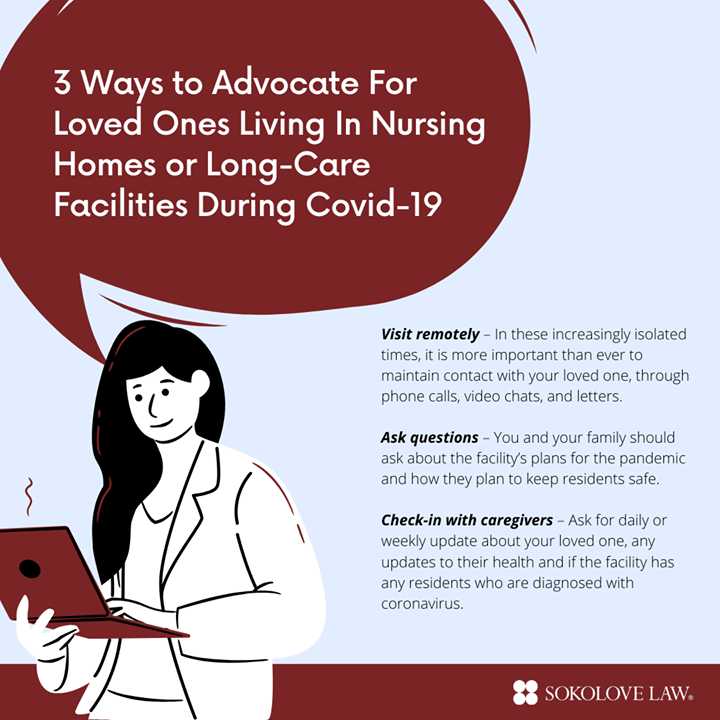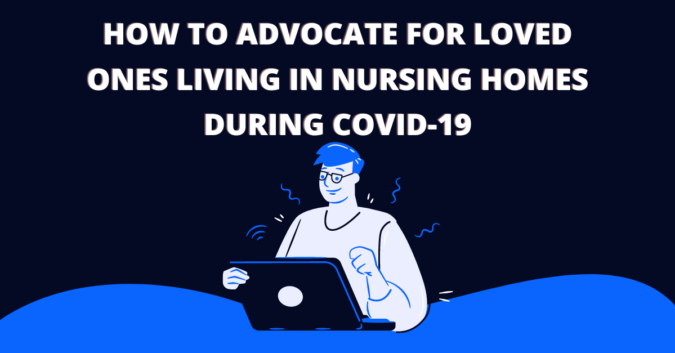One of the main strategies nursing homes are using to combat the spread of coronavirus is to restrict visits from family. While the reasoning behind this decision is easy to understand, the consequences can be difficult to live with.
For many who have loved ones in nursing homes, constant physical separation has become a new normal. The routine visits that formed the backbone of a treasured relationship are no longer possible.
Families also lose the first-person perspective of a nursing home visit. Instead of making their own observations, they have to rely on what’s communicated to them.
It’s frustrating, especially with visiting restrictions that vary by state, and change as new outbreaks emerge.
All of these factors make advocating for someone in a nursing home much more difficult.
Difficult, but not impossible.
Being present for someone you care about means more than just being there. With a little bit of diligence and creativity, you can provide support and get the information you need to make timely decisions.
3 Ways to Advocate for Loved Ones Living in Nursing Homes

1. Visit Remotely
Someone living 50 years ago would gape in wonder at the methods people have to stay in touch across long distances. As coronavirus imposes new barriers in communication, be inventive about using new forms of technology to bridge the gap.
At the same time, don’t forget about traditional ways people share sentiments when they can’t be together. The best strategy is to choose a mix of methods and go with what works.
Some of the best “visits” include:
- Car parades
- Cards and letters
- Care packages
- Dedications (on the radio, podcast, or intercom)
- Phone calls
- Video chats
- Visuals to show support (tying ribbons around trees, for example)
Find a new set of rituals and media that puts everyone in contact. Make it both routine and spontaneous. Never underestimate the morale boost of a positive surprise at a nursing home.
No matter how you choose to visit remotely, the key is to be deliberate about it. Show the person that they matter, put the time in, and change their day.
Tips for Visiting Remotely
- Find out the best times to make calls or video chat
- Make sure they have a charger (or an extra)
- Try reading over the phone
2. Ask Questions
It’s impossible to advocate for someone if you don’t have all of the relevant information. During remote visits, be sure to ask how things are going.
If possible, encourage the resident to call often and check in anytime changes are made. Make it as routine as it needs to be to stay informed. This might include calls after they talk with a doctor, or after new tests have to be ordered.
Find out what the nursing home or long-term care facility is doing to address the coronavirus. Does it appear like staff are following the infection-control policies? Does the staff work to engage the person in safe activities?
Information from your loved one is as close to first-hand as possible, given the circumstances. It’s important to check in with caregivers (more on that below), but you may not always get the full story.
The point of asking questions is to minimize surprises and ensure that your decision-making is based on the most up-to-date, accurate information.
Tips for Asking Questions
- Don’t let anxiety control your questions
- Figure out the care schedule and time calls accordingly
- If they don’t want to talk, tell them that’s OK and try later
3. Check in With Caregivers
Much of the crucial information you need to advocate effectively will come from the caregivers and other staff at the nursing home.
Setting up healthy lines of communication is absolutely essential, especially because the time caregivers spend with patients is limited due to coronavirus. These conversations are precious moments where you need to ask the right questions.
In addition to staying on top of your loved one’s care and condition, you want to make sure you understand the current risk level of the facility, and the steps they are taking to address issues.
Critical questions include:
- Are health services being maintained safely?
- Have any residents tested positive for COVID-19?
- What is management doing to screen employees and maintain a clean facility?
- Have there been outbreaks at nearby facilities?
Familiarize yourself with the staff and try to remember names. Be observant and to the point with your questions. If there are problems at the nursing home, speak up. And if issues and problems are minimal, be sure to thank the staff for the care they provide.
Tips for Checking in With Caregivers
- Designate one individual as the “point person” for caregivers to call
- Find the best times to call, such as after rounds when nurses have the latest information
- Try to speak to the person who is in charge of the resident’s care
These are just some of the ways that people can stay in contact with their loved ones residing in nursing homes.
During the COVID-19 pandemic, we all need to be creative in how we demonstrate our love. Staying in touch and “being present” — whether it’s through a phone call or a video chat — is the best way to let your loved ones know how much you care about them.
